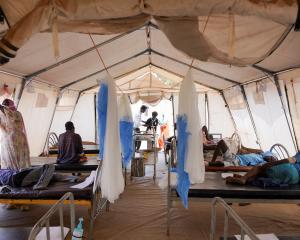Sudan's President Omar al-Bashir, facing an arrest warrant from the International Criminal Court (ICC) for genocide and war crimes, fled from an African Union summit meeting on Monday before the conference ended.
The South African High Court was going to order him arrested and handed over to the ICC, but the South African Government let him fly out of a military airport near Pretoria.
There is outrage in South Africa at this breach of the law, but there is also a belief in the rest of the continent (especially among national leaders) that the ICC is prejudiced against African countries.
Is the ICC out of control, or is it just trying to do its job?
President Jacob Zuma's government had a serious public relations problem.
In the past month South Africa has seen a great deal of xenophobic violence against illegal immigrants and their property.
It's embarrassing for Mr Zuma, and clearly contrary to the spirit of African solidarity, so he felt that he couldn't let an African head of state be arrested while attending an AU summit in his country.
The resentment of poor South Africans at the presence of so many illegal immigrants from other African countries (probably between 5% and 10% of the population) is understandable but inexcusable.
The right solution is for South Africa to take control of its borders, but meanwhile Mr Zuma has to placate his African Union partners.
Mr Zuma had to sneak Mr Bashir out of the country because South Africa's High Court is still independent, and it was about to rule Mr Bashir must be handed over to the ICC for trial.
Indeed, Judge Dunstan Mlambo did rule exactly that: ''The Government's failure to arrest Bashir is inconsistent with the Constitution'', only hours after Mr Bashir fled.
Well, obviously. Since South Africa is one of the 123 countries that signed up to the ICC, it is legally obliged to enforce its arrest warrants.
Some other African countries also take the ICC seriously.
In 2012, an AU summit was moved from Malawi after the Government refused to let Mr Bashir attend, and in 2013 the Sudanese president had to leave Nigeria earlier than planned after a rights group went to court to compel the authorities to arrest him.
But most African governments now ignore ICC rulings because, they say, the court only targets African criminals, and it's true that all the arrest warrants now in force are for Africans.
This understandably causes deep suspicions in the African continent.
The wounds of colonialism are still raw, and it just feels wrong.
But which of these people would you want to drop from the list?
Joseph Kony, the self-proclaimed prophet whose Lord's Resistance Army murdered tens of thousands of innocent people in northern Uganda and adjacent countries?
Jean-Pierre Bemba, a former Congolese rebel leader who is on trial for crimes against humanity and war crimes over alleged cases of murder, rape and pillage in the Central African Republic in 2002 and 2003?
Or Ivory Coast's former president, Laurent Gbagbo, who faces four charges of crimes against humanity, murder, rape and other forms of sexual violence, persecution and ''other inhuman acts'', in the violence that followed disputed elections in 2010?
Not any of these men are being lynched.
They have just been summoned to face a trial, with all the legal rights they are accused of denying to others.
And in most cases, the prosecutions have been undertaken with the support of the relevant African country.
African countries dominate the list for two reasons. One is that more than half the world's wars are in Africa.
The other is that African countries, so vulnerable to violence, have a strong interest in establishing the rule of law, and most African lawyers and senior civil servants understand that.
They are often thwarted by their presidents and prime ministers, who belong to a very exclusive club.
African leaders are as prone as any other interest group to try to exempt themselves from rules that hold them legally responsible for their actions.
The ICC has also made mistakes, like bringing cases against senior politicians when there was no realistic chance of getting the evidence needed for a conviction (like President Uhuru Kenyatta in Kenya).
But even if it fails much of the time, the ICC is a worthwhile enterprise.
It is part of a long-term effort to build a world that is ruled by law, not by force, even if that goal is still a century in the future.
And in the meantime, it occasionally gives the victims justice right here in the present.
• Gwynne Dyer is an independent London journalist.












